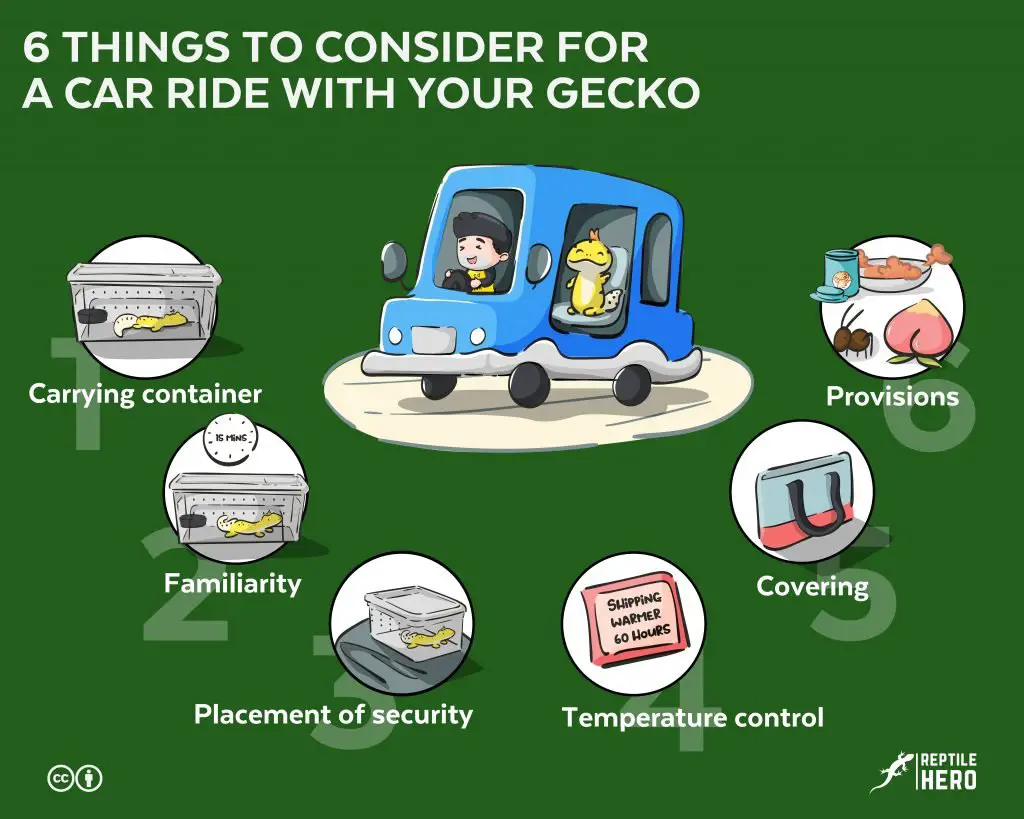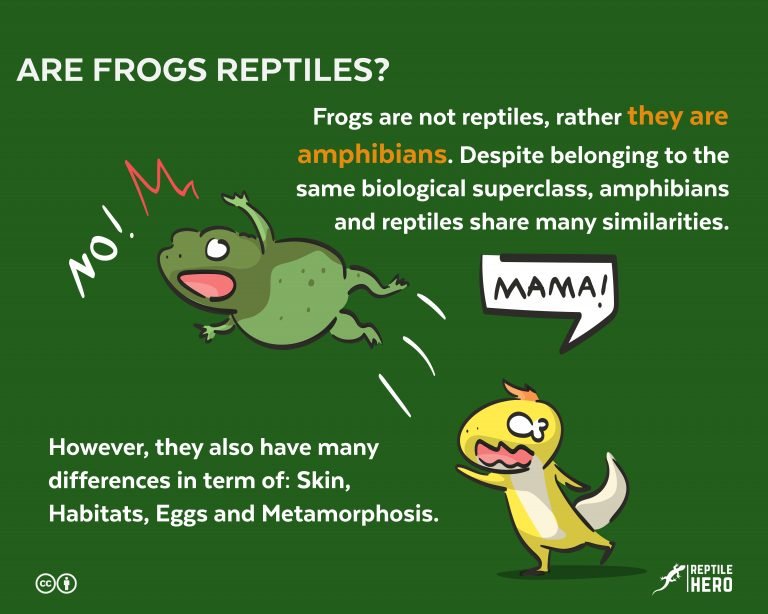How to Travel In a Car With Your Gecko? [6 Dos and 2 Don’ts]
Geckos are one of the easiest reptile pets to care for and are relatively low-maintenance – however, there are a few key things to keep in mind even if you’re only going to bring them along with you for a short trip to your exotic vet’s clinic. So how can pet parents properly and safely travel with their geckos in a car?
Regardless of the purpose and total time of travel, consider the following when traveling with geckos: 1) carrying container, 2) familiarity, 3) provisions, 4) temperature control, 5) covering, and 6) placement for security. It’s inadvisable to take your gecko on long trips with frequent stop-overs and loud music.
Come with me as I discuss all there is to know about car rides with geckos in greater detail!
Car Travel with Your Gecko: Start with the Basics
Let’s face it, life’s full of surprises and uncertainties. So as gecko keepers, we must always be ready to adjust and make changes in life as they come and go. In the same way, we should also know how to come and go while on trips with our lovely little reptile babies.
6 Things to Consider for a Car Ride with Your Gecko
You might go back home for an extended period or take a month-long vacation somewhere else. Ideally, you’d have someone else close to home that could take care of your baby for you.
Of course, you also need to need to move to a state miles away or regularly visit your local veterinary for a routine check-up. In all of the aforementioned situations, you will probably consider and need personally transporting your gecko while you travel by car.
I’ve briefly touched on this topic in a previous article on what to do with your geckos when you’re planning to go on vacation. But now, I’m going to give you the lowdown on traveling with your gecko!

#1 – Carrying Container
In reality, transporting reptiles, geckos included, is actually an easy and straightforward task. You could safely go on a trip with them without having to worry much about adversely affecting their health aside from possibly stressing them too much on your journey. That is, as long as you keep them in a good carrying container.
There are plenty of options available in your local supermarket, pet store, online shop, and even at home! Good options for temporary carrying containers include all-purpose pet boxes (here on Amazon), deli cups, plastic terrariums (here on Amazon), plastic bins, stacking drawers, and even food storage boxes.
Gold tip: Make sure to poke a few holes on the sides or in the lid for proper ventilation. These should be small enough so your gecko can’t escape through them.
If there are no locks on the container, you could also tape the lid to two opposite sides so it doesn’t suddenly pop off. Then, line the bottom with a paper towel for easier cleaning and replacement of temporary substrate.
Geckos should be kept in a well-ventilated small plastic container to restrict their movement and prevent injuries. Such temporary housing must be devoid of clutter if possible that could potentially harm your gecko (e.g., rocks, branches). Additionally, the bottom should be lined with a paper towel instead of a loose substrate.

Some owners have also brought their geckos along for the ride in their original tanks. However, I personally wouldn’t do this nor recommend it to you because it’s too spacious and might crack in case of an abrupt stop. Seeing as the car will constantly be on the move, they might get thrown all over the place. Plus, vivariums usually have a lot of decor in them that could move around and hit – or even crush – your soft-bodied friend.
I mean, sure, you could put a few essential things in there like a makeshift hide from a few crumpled papers or an even smaller plastic box. Soft plants are okay too to make it homier. Other than those, they don’t really need anything else.
I’ve also heard from a friend that he once saw a gecko owner bring their gecko to the vet using a foldable cat carrier. The gecko seemed pretty chill about it but I don’t think I’d try doing that anywhere in the near future.
#2 – Familiarity
Reptiles, geckos especially, are known to need quite a bit of adjustment time before behaving as they normally should when placed in a different enclosure.
So even if you don’t have plans of moving or going on a trip anytime soon, I suggest you prepare a carrying container for your gecko well in advance.
Have them familiarize themselves with their temporary tanks to reduce the risk of stressing them out once you do have to take them on a car ride. Ideally, they should be given at least a week to try out their temporary homes.
Let your gecko spend a few minutes a day in its carrying container. You can start with 15 minutes. Increase time increments for each session until your gecko is okay with staying in there for an hour or so. This is not necessary, but will limit the stress your gecko will undergo in such a travel, especially if the journey is many hours long.
Other than that, let them go about their day as they normally would. Let them eat, sleep, drink, and explore in their original vivariums. Keep their routine relatively consistent.
Don’t leave them alone in a separate room when you do though and do make sure that they don’t get too hot or cold. They might start associating their temporary carriers with negative experiences if you do.
#3 – Provisions
You might think that you should pack food and water for your geckos if you’re going to bring them with you while you travel by car. That, however, isn’t actually the case. Geckos, and most other herps, don’t need water and food especially on trips that take less than a day to complete unless ambient temperatures reach 86°F (30°C) [1].
Most people advise against feeding geckos two days before traveling as well as feeding them while still on the road to prevent indigestion and regurgitation of food. It might sound cruel but it actually isn’t. Remember, geckos, much like every other lizard, can last a few days without being given food and water.
Still, I do understand that most, if not all, keepers would prefer to stay safe than sorry and bring along a bunch of provisions for their reptile companions. There’s water, food, additional paper towels, other cleaning supplies, and many other things.
For short car trips (less than 24 hours), geckos do not need water and food. For long car trips longer than 24 hours, water and food should be supplied to them.
I would advise against placing a water dish in their carrying container when traveling. Just bring a small spray bottle to mist them every so often, they can lick off the condensation if they need to. If it’s hot out and in the car, moisten the paper towel lining the bottom as well.
Also, if you’ll need to pack food for your gecko, you could opt for freeze-dried live feeders like this one on Amazon for less hassle and mess. You won’t have to deal with the nightmare of having live feeders hopping and crawling all over the car.
#4 – Temperature Control
As you probably know by now, geckos are very sensitive to changes in temperature since they are considered “cold-blooded” animals. Meaning, they rely heavily on their surroundings to regulate their body temperature.
Geckos don’t need heating and/or cooling materials while traveling by car unless the car temperatures are below 65°F (18°C) or above 90°F (32°C). Most often, a normal ambient temperature of about 75°F (24°C) in your car is safe for geckos.
You can’t exactly bring all their heating equipment in the car to make sure they’re comfortable. Since they’ll be confined in a much smaller space, doing so isn’t safe either. They could get thermal burns and dehydrate much quicker. So how do you heat and cool them up while traveling by car? Well, there are a few ways you could try out.
Use a shipping warmer pack (here on Amazon), hot water bottle, or a warm bag of rice to help your gecko warm up while traveling in cold weather. Conversely, other solutions can be cold compress (here on Amazon), an ice pack, a frozen rice packet, or a bag of frozen coconut oil to help your gecko cool down while traveling in hot weather.
Make sure none of the aforementioned materials come into direct contact with your gecko [1]. Wrap a few layers of paper or cloth around them first and then place them outside their carrying containers. Some people put it on top or below the containers. However, an acquaintance who worked for a large reptile shop says that doing so often causes death for animals being shipped.
It would be much better to position the heating or cooling element on a single side so that there is a temperature gradient within the small box. Don’t forget to monitor the temperature inside their temporary tank using a thermometer. Go the extra mile by placing their temporary tanks in an insulated shipping box, polystyrene foam cooler, insulated lunch bags, or with a simple thick towel.
#5 – Covering
Although there aren’t really many studies to explain and back up the theories behind it, several keepers and breeders have experienced seeing extremely stressed out geckos when they are kept in temporary carrying tanks that are all clear and see-through.
It’s highly possible that the ever-changing scenery, as well as the intense light entering the car, are enough to overwhelm and freak out your gecko.
To make sure your gecko doesn’t get upset by these, you can keep their tanks in another layer of insulation as I’ve previously mentioned.
You could also simply cover up all but one side of their tanks with dark tape or paper to make them feel much safer. By doing so, you can still check up on them even while you’re driving. Tote bags, pillowcases, and towels are great options as well.
Take it a step further by installing a few window shades inside your car. Better yet, have your windows tinted.
#6 – Placement for Security
From all the previous factors I’ve pointed out so far, it’s quite obvious that the placement of your gecko’s carrying tank is quite important.
Experts recommend placing temporary carrying containers either on the passenger seat or on the floor right in front of it. By doing so, you can readily check on your gecko.
It should preferably be kept away from places that received direct sun exposure like the dashboard. Placing it right in front of the air conditioning (AC) unit isn’t advisable either.
However, you shouldn’t keep it in the back because it will be harder to check on them in that way. They could be gaping from overheating and they might’ve even escaped without you noticing anything wrong.
Think about sudden breaks and speed bumps too – the shaking, tumbling, and all that. Even if you make sure to address all the 5 points I’ve listed, your gecko and its tank could get thrown all over the place if not tightly and securely restrained.
Use the seat belt, a rope, some harness, or a couple of bungee cords, to safely secure your gecko’s carrying tank in the car. Placing a pillow or thick towel below or around it can also provide additional cushioning.
2 Things to Avoid When Traveling with Your Gecko via Car
There are three major don’ts you should never do when traveling with your gecko. Although none of these will necessarily harm your geckos, it’s still best to give them a stress-free trip if you could. Remember, tail dropping is a common consequence of extreme distress.
#1 – Frequent Stop-overs
Though I have heard of rare cases where gecko owners have successfully transported their geckos, along with their many other pets, via car in as long as 3 days, it’s not something you’d hear frequently.
Even in those rare cases, they don’t drive straight continuously for days on end. Pet parents would usually check into pet-friendly hotels so they can rest. This gives them time to feed and check on their babies too.
Others recommend bringing bigger tanks for geckos to stay in at night but I think that would just exacerbate the stress they’re probably already experiencing. I mean, just imagine it – you’re kept in a dark box for hours but each time you’re taken out of your temporary home, your eyes are greeted by another strange and unfamiliar sight.
Why prolong the agony? The sooner your trip ends, the faster your gecko can get back to doing its normal routine. Stick to short trips with your gecko in tow, if you can’t don’t bring them with you.
#2 – Music on Full Blast
Who doesn’t want music blasting from the speakers during road trips and playing car karaoke? Well, your geckos might not be the biggest fan.
You could try and argue that the insulation you’ve wrapped your gecko’s temporary housing in would be enough all you want. But really think about it. If you have a neighbor that’s belting out his heart and soul while you’re trying to get some rest in bed, it can be pretty bothersome even when you try to block out the ruckus by covering your ears with a pillow.
Despite having ears that are less sensitive to sounds than humans, and most other mammals, geckos don’t do well with extremely loud sounds regardless if they’re abrupt or sustained.
Learn more about how geckos hear and their sound sensitivity by reading this article we’ve already published.
What to Expect After a Car Ride with Your Gecko
Understandably, your gecko may show mild signs of stress after taking a ride in your car for the first time. They may not eat anything or explore as much as they normally would for a day or two after arriving at a new place or getting back home.
Some owners say their little gecko dragons seem to take a liking to car travels after a couple of rides, however, others also say that their geckos never seem to get comfortable while traveling.
To make it easier for them to re-acclimate themselves, other pet parents said that slowly exposing them to their new environments has done wonders. They don’t wave their tails defensively or anything at all. Don’t be so quick to get them out. Instead, slowly take off the covers on their carrying tank before handling them.
Can Your Gecko Get Car Sick?

Newsflash – geckos can experience car sickness from traveling [2]. It hasn’t really been well-documented but there is some evidence for it.
At first, I thought that was just some sort of old wives’ tale within the reptile-keeping community. However, once I delved deeper into the topic, I found out that there was some truth to this claim.
Geckos, like humans and many other animals, may suffer from motion sickness. Signs include gasping, lethargy, and vomiting. In extreme cases, it could lead to death.
Because the information on this is scarce, I’m really not sure what causes this. I mean, they’re known to have sticky feet that allow them to basically defy gravity, right? Hopefully, in the future, more scientists will investigate this so we know how to prevent and treat it.
Taking all of that into consideration, I highly advise against frequently bringing your gecko round in a car for travel unless you actually need to.
Takeaways
If you need to travel by car anywhere with your gecko, give them a dedicated carrying container, let them familiarize themselves with it, bring necessary provisions with you, monitor and regulate for temperature, provide them some covering, and secure them in place.
Don’t go on long trips with frequent stop-overs and insanely loud music if your gecko is with you.
Geckos can experience motion sickness.

![Can You Have a Gecko and a Cat Together? [Yes, But…]](https://www.reptilehero.com/wp-content/uploads/2021/11/Gecko-and-cat-together-cc-768x614.jpg)


![Do Geckos Fart? [4 Potential Reasons]](https://www.reptilehero.com/wp-content/uploads/2021/05/why-geckos-fart-cc-768x614.jpg)
![Why Does Your Gecko Lick? [You, Themselves, and Other Objects]](https://www.reptilehero.com/wp-content/uploads/2021/05/gecko-lick-object-cc-768x614.jpg)
![Homemade Crested Gecko Food [10 Recipes]](https://www.reptilehero.com/wp-content/uploads/2021/05/G47-768x614.jpg)
